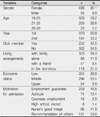Abstract
Purpose
The purpose of this study was to investigate the effects of ego-resilience and stress coping styles on college adaptation in nursing students.
Method
The sample for this study consisted of 1st and 2nd year students from 3 colleges of nursing, one each, in Jeolla, Chungcheong, and Gyeongsang Provinces. The data were collected from November 5 to 22, 2010. The data were analyzed using t-test, ANOVA, Pearson correlation and multiple regression with SPSS 18.0.
Results
A positive correlation was found for college adaptation with stress coping styles and ego-resilience. The strongest predictor of college adaptation was an optimistic attitude. In addition optimistic attitude, satisfaction with nursing as a major, confidence, academic scores, age, emotional control, and gender accounted for 63.3% of variance in college adaptation.
Figures and Tables
References
1. Aspinwall LG, Taylor SE. Modeling cognitive adaptation: a longitudinal investigation of the impact of individual differences and coping on college adjustment and performance. J Pers Soc Psychol. 1992. 63:989–1003.

3. Billings AG, Moos RH. Coping, stress and social resources among adults with unipolar depression. J Pers Soc Psychol. 1984. 46:877–891.

4. Block J, Block JH. Collins WA, editor. The role of ego-control and ego-resiliency in the organization of behavior. Minnesota Symposia on Child Psychology. 1980. Vol. 13. Hillsdale, NJ: Erlbaum;39–101.
5. Cho HJ. A study of the impact of parental attachment and separation-individuation on college student adjustment. 2005. Seoul: Yonsei University of Korea;Unpublished master's thesis.
6. Cho SJ. The relationship between attachment to parents and adjustment to college. 2000. Pusan: Dong-A University of Korea;Unpublished master's thesis.
7. Choi J. Effects of emotional intelligence and ego-resilience on adjustment to college life. 2009. Seoul: Yonsei University of Korea;Unpublished master's thesis.
8. Faul F, Erdfelder E, Lang AG, Buchner A. G*Power 3: A flexible statistical power analysis program for the social, behavioral, and biomedical sciences. Behav Res Methods. 2007. 39:175–191.

9. Folkman S, Lazarus R. If it changes it must be a process: study of emotion and coping during three stages of a college examination. J Pers Soc Psychol. 1985. 48:150–170.

10. Garmezy N. Garmezy N, Rutter M, editors. Stressor in childhood. Stress, coping and development in children. 1983. New York: McGraw-Hill;43–84.
11. Ha JH, Jo HI. The relationship among perfectionism, stress, the ways of stress coping, self-efficacy, college adjustment. Korean J Couns. 2006. 7(2):595–611.
12. Hyun JW. The effect of perfectionism and evaluative threat on the performance of task. 1992. Seoul: Yeonsei University of Korea;Unpublished master's thesis.
13. Jang HS. Social - Emotional Development : Resilience as a factor interrupting psychological disorders. Korean J Dev Psychol. 2001. 14(1):105–119.
14. Klohnen EC. Conceptual analysis and measurement of the construct of ego-resiliency. J Pers Soc Psychol. 1996. 70(5):1067–1079.

15. Kim AR. The relationship of self-resilience, hardiness and stress coping style. 2010. Daegu: Catholic University of Korea;Unpublished master's thesis.
16. Kim JH. Relations of perceived stress, cognitive set and coping behaviors to depression: a focus on freshman's stress experiences. 1987. Seoul: Seoul National University of Korea;Unpublished doctoral dissertation.
17. Kim MY, Park WJ. Ego-resilience, stress coping styles and disposition to delinquency in middle school students. J Korean Acad Child Health Nurs. 2008. 14(4):415–422.
18. Kim NS, Lee KE, Kwon MK, Kim HW. Ways of coping and health-related hardiness in university students. J Korean Acad Fundam Nurs. 2007. 14(2):239–247.
19. Lee HN, Jeong HJ, Lee KH, Lee HJ. The relationship among stress perception, stress coping, ego-resilience and happiness of university students. Korean J Couns. 2006. 7(3):701–713.
20. Lee SJ. The effect of sense of social connectedness and autonomy on college adjustment and subjective well-being among University students: Testing a mediation effect of interpersonal problems. Korean J Sch Psychol. 2009. 6(2):229–248.

21. Lutha SS, Cicchetti D. The construct of resillience: Implications for interventions and social policies. Dev Psychopathol. 2000. 12(4):857–885.

22. Munakata T. Behavioral science in health and illness. 1996. Tokyo: Mejikarufurendosha.
23. Park HJ, Jang IS. Stress, depression, coping styles and satisfaction of clinical practice in nursing students. J Korean Acad Soc Nurs Educ. 2010. 16(1):14–23.

24. Park HJ. Perceived stress, coping process and depression to ego-resilience. 1996. Seoul: Korea University of Korea;Unpublished master's thesis.
25. Park YS, Hyun EM. Ego-resilience and stress coping styles of adolescents. J Korean Home Manage Assoc. 2007. 25(6):83–94.
26. Park WJ. The influence of ego-resilience on critical thinking dispositions, learning styles, and academic adjustment in nursing students. J Korean Acad Psychiatr Ment Health Nurs. 2009. 18(3):240–250.
27. Seligman MEP. Learned Optimism. 1991. New York: Knopf.
28. Sung MH. The relationships between peer attachment, self-esteem and adjustment to college life in female college students. J Korean Acad Public Health Nurs. 2008. 22(1):84–96.




 PDF
PDF ePub
ePub Citation
Citation Print
Print









 XML Download
XML Download